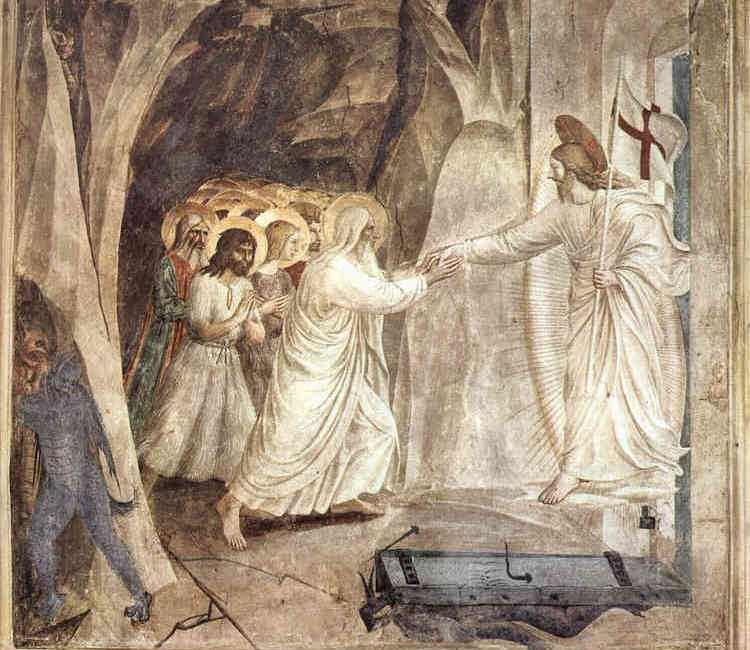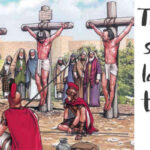The conventional christian view of hell is surely wrong.
It isn’t taught in the Old Testament, nor in the New. It wasn’t what Jesus taught and it wasn’t what most rabbis of his day taught. It doesn’t make sense.
I found out forty years ago that the conventional view of hell was based on a misunderstanding, but it is only recently that I have done the research to understand it better.
If you, like me, find the idea of hell repugnant, read on for some good news.
My history with hell
My parents sent me to Sunday School as a kid, and later to youth group. And there I was taught about hell, a lurid threat to push us towards committing our lives to Jesus. It was the stuff of nightmares. I didn’t like the idea much, but I was told it was true, it was there in the Bible, and so I accepted it.
But it didn’t seem right or fair, and so when I read a Professor of New Testament Greek, writing in an impeccably evangelical commentary, telling me we were misunderstanding the Greek, I read his explanation avidly. I gave up belief in the hell of popular imagination immediately.
Years later, I checked out the ideas current in Jesus’ day as an indication of what Jesus may have meant when he talked about hell. Later still, I read about the development of the Jewish ideas of hell and the afterlife in the Old Testament, and in the fertile period between the Old and New Testaments.
The picture was clear and consistent. I updated my page Hell – what does the Bible say? And here is a summary of what I’ve learnt.
Seven truths
1. The word “hell” isn’t in the Bible
Hell is a germanic word, and obviously isn’t in the Bible, which was written by Jews. The word that is translated as “hell” is the Greek Ge’enna, which comes from a Hebrew word which literally means the valley of Hinnom. This valley, just outside Jerusalem, had an evil reputation, and was used in Jesus day as a place where rubbish was burnt.
“Gehinnom” had come to be used, figuratively, as a place where people were purified after death, before they could enter into paradise. It didn’t have the same meaning as “hell” does today, but was more like the Catholic “purgatory”.
2. Only Jesus mentions hell (with one minor exception)
Gehenna is mentioned a dozen times in the New Testament, 11 times by Jesus. The 12th time is in James, where it is used as a synonym for ‘evil’ and says nothing of punishment. Hell is never mentioned by Paul and never mentioned in any context outside Israel.
Paul does talk about judgment, and judgment is a strong theme in Revelation, but the word gehenna isn’t mentioned.
So the christian understanding of “hell” depends on what Jesus meant by the term.
3. The Jews of Jesus’ day didn’t believe in “hell”
There is no belief in an afterlife in the Old Testament until very late (in Daniel 12), and few details are given. For most Old Testament Jews, life ended at death, and the state of souls in Sheol (“the grave”) couldn’t be considered as “life”.
But in the period of several centuries between the Old and New Testaments, Jewish thinkers and rabbis developed a large number of different ideas about souls, an afterlife, resurrection and judgment.
By the time of Jesus, most Jews believed there would be a bodily resurrection at the end of the age. The common view was that body and soul would be re-united and everyone would be judged. The righteous would ascend straight to paradise while most people would be purged of their sins in Gehinnom for no more than a year before gaining paradise. The wicked would not see paradise, but would forfeit their life – only a small minority believed that the wicked would be punished forever.
Other views were held, but these would have been the beliefs Jesus would have been most familiar with.
4. What did Jesus teach?
Jesus was a man of his time (even though divine) and discussed with other rabbis and the Pharisees the religious issues of his day. On many issues, he sided with one school of thought (mostly following rabbi Hillel) over another.
It is quite clear from the gospels that Jesus believed in resurrection, judgment and the possibility of paradise, just as most other rabbis taught. His views on the fate of the wicked appear not to have been very different either, as we shall see.
5. “Eternal” doesn’t mean “everlasting”
In several places Jesus offers the hope of “eternal” life and warns of the possibility of “eternal” punishment. But this is where there is a common misunderstanding.
The word translated “eternal” (aionios, from aion = “age”) does not mean “forever” or “everlasting”, but refers to the age to come. (Even conservative Bible scholars agree here.) The Jews divided time into the present age, which was evil and in which their nation was oppressed, and the age to come when the Messiah would put things right and life would be a paradise.
So eternal life and punishment are not necessarily everlasting, but are life and punishment in the age to come. The punishment could be short time (such as less than a year) or longer, or forever – the term “eternal” doesn’t make that clear.
6. The options are “life” and “no life”
But another word Jesus uses does make things clear. He says we should fear him who can destroy body and soul in Gehinnom. And destroy means exactly what it says – an end to life. There is no suggestion of punishment that never ends, just the possibilities of life in paradise, or an end to life.
7. Gentiles too?
All of this refers generally to Jews only. But some rabbis taught that righteous non-Jews would be treated the same as righteous Jews and would gain paradise.
The resurrection of the righteous
Based on this information, we can assess the three views about hell common in the christian church today.
1. Eternal conscious torment
This is the most common view, that those who don’t accept God’s grace in Jesus are punished in hell forever and ever. But not only does these seem wildly unjust (an infinite sentence for a finite sin) and unloving in the extreme, we have seen that it is contrary to Jesus’ teaching and to the common belief of his day. It isn’t taught anywhere in the Bible. It seems to be based on the idea (that the Bible doesn’t teach) that we have an immortal soul that God cannot destroy, and so the souls of the unrighteous must continue on being punished forever.
Only some graphic language used by Jesus and in the book of Revelation could be interpreted to support eternal conscious torment.
- Jesus speaks of the worm not dying and the fire never going out in “hell”, but it seems the Greek here is emphasising “immutability” rather than duration.
- Two passages in Revelation suggest eternal torment, but (i) the word “gehinnom” is never mentioned, (ii) neither passage specifically says people will be tormented forever, (iii) the terrible imagery of Revelation (lake of fire, second death, etc) suggests destruction rather than continuing torment, and (iv) it is unwise to take the apocalyptic symbolism of Revelation too literally, here and elsewhere.
So the plain teaching of Jesus must be preferred. We can and should reject “eternal conscious torment”.
2. Universalism
Perhaps, in the end, God’s love will win out. Non-believers will not perish, but will be purged in “hell”. They will be shown God’s love and eventually they will repent and accept God’s offer of forgiveness, and enter paradise. This view is based on a number of passages in the Bible but tends to downplay others.
Universalism may be true. We can certainly hope it is true. But it doesn’t really conform to Jesus’ teaching about judgment and I cannot accept it, much as I would like to..
3. The resurrection of the righteous
This third view, sometimes called annihilationism or conditional immortality, most closely conforms to both Jesus’ teaching and the prevailing view among the Jewish teachers of his day. It says that we human beings are just “dust”, and would return to dust when we die, except by God’s grace we may be resurrected to a new bodily life on a new earth. Those who don’t accept God’s grace forfeit their opportunity for life in the age to come.
Thus I think a more appropriate name is “the resurrection of the righteous”, because we are not immortal and we aren’t annihilated; rather, we either do or don’t receive the gift of resurrection of the body. Of course we remember that in christianity, righteousness is something given to us through the death of Jesus.
Only one conclusion?
So I believe the resurrection of the righteous, and the merciful end of life for the unrepentant, is the belief of the Bible and Jesus, and should be our belief today.
Not only do I believe it is true, but it is more humane. It shows God to be a God of grace, love and forgiveness, not the heartless tormentor of eternal conscious torment.
And that is good news for those of us who believe and gives us a more attractive message to those who don’t yet believe.
I didn’t make all this up!
I have done my research, checked out the Bible, read what expert linguists say, checked out what historians and Jewish teachers tell us about prevailing views in Jesus’ day. I have written it all down, with references, in Hell – what does the Bible say?
Graphic: Before his resurrection from the dead, Jesus Christ grants salvation to souls by the Harrowing of Hell. Fresco, by Fra Angelico, c. 1430s. Wikipedia





So do you think humans have souls that transcend the body’s lifespan ?
If not, what is ‘resurrected’ in a new body ?
No I don’t think that souls have a separate existence. I’ll have to look at the text and make sure I make that clearer (thanks).
The Jews of Jesus day generally believed (so I read) that the soul continued on in “sleep” until the end of the age when the body would be resurrected and re-united with the soul. But I don’t think that is the christian view. The christian view (I think) is that the “soul” is the life, mind and humanity of the person, and is totally bound up with the body. If the body dies, the life, mind and humanity all die. If God resurrects the body, the life, mind and humanity are resurrected too. It’s all or nothing.
I don’t think we can really know these things except in a vague and analogical way, it is all way beyond our experience. So that is about the best I think I can say.
What do you think?
I agree with your statement “I don’t think we can really know these things except in a vague and analogical way, it is all way beyond our experience.”.
My ‘preferred belief’ is that our soul is immortal and is continually reincarnated in successive bodies to continue our journey into a higher spiritual state . While we don’t remember our previous lives , our experiences are incarnated into our personalities, good people are at a higher state of spiritual development, and there are obviously degrees of evil to good.
I don’t have any documentation of this obviously, but I’ve heard enough tales of near death experiences, anecdotal as they are, to at least accept soul/body separation as at least a possibly, and probably a better one than ‘one life is all you have’, and its eternal death or eternal life.
I find it hard to believe that people (say aboriginals) who have never heard of Jesus or the Bible through no fault of their own are condemned to death for ignorance.
A late relative of mine who had no reason to lie said that the saw the ‘ghost’ of a neighbor after the neighbor had died.
Anyway, reincarnation seems a more plausible explanation of why we are here, ie continual development and advancement through learning and experience, which mirrors our mortal lives indefinitely.
Maybe that’s what I ‘want to believe’, but it keeps me happy. 🙂
Hi, we agree on many things, but there are a few things here where we see things differently, and a few things worth a comment.
“I’ve heard enough tales of near death experiences, anecdotal as they are, to at least accept soul/body separation as at least a possibly”
I have investigated NDEs, and I too think there is something in them, though I’m unsure how much. I have written up my thoughts in Near death experiences.
“I find it hard to believe that people (say aboriginals) who have never heard of Jesus or the Bible through no fault of their own are condemned to death for ignorance.”
Yes, I find that difficult to believe too, and I don’t believe it. I think that would be unjust, and I think there are a few hints in the Bible that it isn’t so.
“Maybe that’s what I ‘want to believe’, but it keeps me happy. “
Have you investigated religions that believe in reincarnation, like Buddhism or Hinduism?